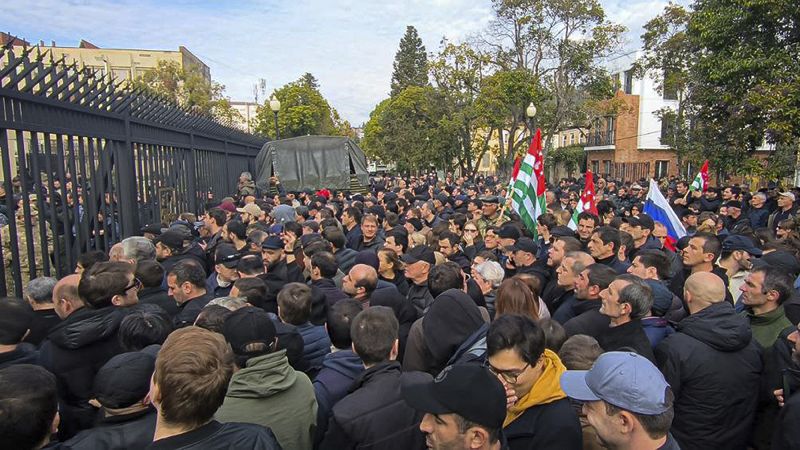
Chaos in Abkhazia: Protesters Take Parliament by Storm in Outcry Against Russia Deal
In a recent troubling turn of events, protesters have stormed the Parliament building in the breakaway region of Abkhazia, demanding a reevaluation of a controversial deal struck between the region and Russia. The unrest and demonstrations in Abkhazia highlight the complex geopolitical landscape in the region and the deep-seated tensions that continue to simmer.
The deal in question, which was signed by Russian President Vladimir Putin and Abkhazia’s de facto leader Aslan Bzhania, involves the integration of Abkhazian military forces with the Russian armed forces. This move has ignited a wave of discontent among Abkhazian citizens, who perceive it as a threat to their region’s autonomy and independence.
Abkhazia, a region that declared independence from Georgia following a bloody conflict in the early 1990s, has long relied on Russia for economic and military support. However, the latest agreement has sparked fears among many Abkhazians that their region is being further drawn into Russia’s sphere of influence, eroding their hard-won sovereignty.
The protesters, consisting of a diverse cross-section of Abkhazian society, including students, activists, and ordinary citizens, have taken to the streets to voice their opposition to the deal. They are calling for greater transparency and consultation in decisions that have far-reaching implications for the future of Abkhazia.
The demonstrations have been met with a heavy-handed response from security forces, with reports of arrests and violence against protesters. The crackdown on dissent has only fueled the flames of anger and frustration among the populace, leading to a volatile situation in the breakaway region.
The protests in Abkhazia serve as a stark reminder of the complex dynamics at play in the South Caucasus region, where competing interests and historical grievances continue to shape political developments. The standoff between protesters and the authorities underscores the precarious balance of power in Abkhazia and the challenges facing its quest for self-determination.
As the situation in Abkhazia unfolds, it is crucial for all parties involved to engage in dialogue and find peaceful solutions to address the grievances of the protesters. The international community, including Russia and Georgia, must respect the aspirations of the Abkhazian people and work towards a resolution that upholds their rights and preserves the region’s fragile stability.
In conclusion, the unrest in Abkhazia underscores the need for a nuanced understanding of the region’s complex history and the aspirations of its people. The protests are a manifestation of the deep-seated concerns among Abkhazians about their region’s future and underline the importance of inclusive dialogue and respect for autonomy in resolving the ongoing crisis.
